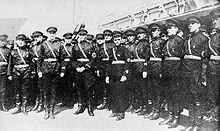Russian Fascist Party

The Russian Fascist Party (RFP; Russian Российская фашистская партия ; sometimes All-Russian Fascist Party ) was a small fascist party founded by Russian emigrants and headquartered in Manchukuo during the 1930s and 1940s.
history

Fascist ideas were also widespread among Russian emigrants in Manchuria since the October Revolution and were propagated there by smaller associations such as the Russian Fascist Organization. At a secret meeting of these various groups, the RFP was finally founded under the chairmanship of the former Major General of the Tsarist Army Vladimir Kosmin . With the appointment of Konstantin Rodsajewski as general secretary of the central committee of the party on March 26, 1931, the latter effectively became its “ leader ”. With its slogan “God, Nation, Labor” and the publication of the Nazija magazine (“The Nation”), the party demanded a policy oriented towards Italian fascism; so it wanted to take advantage of the vacillating attitude of the Bolshevik leadership with regard to external and internal opposition.
Through its collaboration with the Japanese Empire , the RFP developed into the most influential group of emigrants in Manchukuo and even opened a party school in Harbin in 1932 . Rodsajewski also supported the Imperial Japanese Army in founding an all-Russian special unit in the Kwantung Army , which should carry out sabotage actions against the Red Army in the event of a Japanese invasion of Siberia and the Pacific region of Russia .
The party had close ties to like-minded groups in the United States , including that of the exile Anastassi Wonsjazki . The RFP and Wonsjazkis All-Russian Fascist Organization agreed to merge on March 24, 1934 in Tokyo ; There was later disagreement about Rodsajewski's attempt to open up to more conservative Russians as well as about his anti-Semitism , which Vonsyazki found too destructive and too “German”. Eventually the collaboration was terminated and Wonsjatski was expelled in 1935. He then founded the anti-communist splinter group, the Russian National Revolutionary Party , in the United States , with the aim of "forming a truly democratic government in Russia."
Nevertheless, the RFP had grown rapidly under Rodsajewski and, according to its own statements, numbered around 20,000 activists in May 1935. In 1934 the " Russian Fascist Women's Movement " (Rossijskoje Schenskoje Faschistskoje Dwischenije) and various youth organizations were founded as subsidiary organizations of the RFP. Rodzajewski's book The Russian Nation State described the party's objective of introducing fascist conditions in Russia by May 1, 1938, which included plans to persecute the Jews. This indicated a clear break with the moderate Wonsyatski wing. The party also had a strong connection to the Russian Orthodox Church , which it hoped would create a special relationship between church and state in the planned fascist Russia. She also promised to respect the traditions of the different Russian ethnic groups and to advocate corporatism .
When the war broke out, the activities of the RFP outside Manchukuos were slowly stopped, the party itself was restricted in its activities by the Japanese, which was due to the Japanese-Soviet neutrality pact . The end of the party came in 1945 with the invasion of Manchukuo by the Red Army . Rodsajewski ultimately surrendered, was arrested and executed the following year.
literature
- Susanne Hohler: Fascism in Manchuria. The Soviet-China Encounter in the 1930s . In: Library of Modern Russian History . IB Tauris, London 2017, ISBN 978-1-78453-522-3 (English).
- E. Oberländer: The All-Russian Fascist Party . In: Journal of Contemporary History . tape 1 , no. 1 , 1966, p. 158-173 (English).
- К. В. Родзаевский: Завещание Русского фашиста . ФЭРИ-В, 2001, ISBN 5-94138-010-0 (Russian).
- John J. Stephan: The Russian Fascists: Tragedy and Farce in Exile, 1925–1945 . Harper Row, 1978, ISBN 0-06-014099-2 (English).
Web links
- EarthStation1.com - The WWII Sounds & Pictures Page - Russian Fascists WWII Pictures. In: earthstation1.com. (English).
